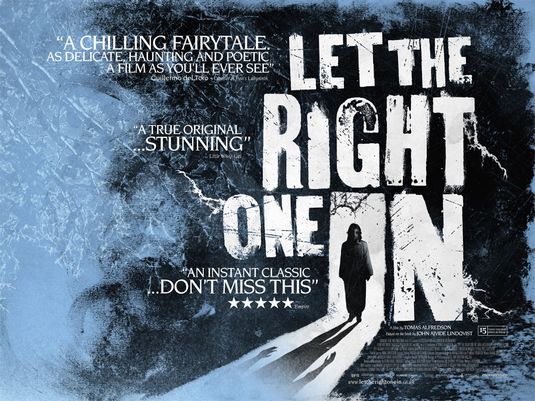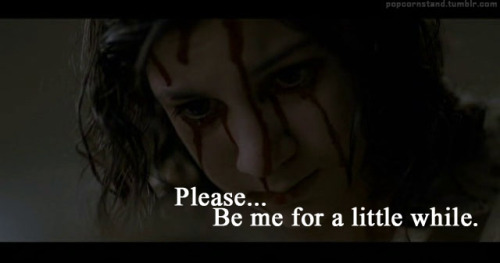"Be Me, for Awhile": Ideological Becoming and Future Objectivity in Let the Right One In
by Michael Dean Benton (2009)
[As for the controversy of the altered English translation on the current Magnolia DVD consult
Icons of Frights thorough analysis and
Jeffrey Wells conclusion that it is a case of the continual dumbing-it-down for the American consumer. My inclination is that all Magnolia and Magnet film releases should be considered problematic.]

I'm working a lot with Bakhtin's conception of the dialogical process of ideological becoming, so I am always fascinated by how people learn new ways of "being-in-the-world". Last night I watched
Let the Right One In (Sweden: Tomas Alfredson, 2008) and later while sleeping I awoke from a powerful dream in which the images of the film were circulating with the words of Bakhtin. Here is what I wrote down:
Film (or, if you prefer, art) can be a tool that allows us to step into the shoes of beings we do not know and for a time wonder how they may perceive the world. International film provides us with a plurality of voices (polylogical discourse) that can provide important counters to the dominant (possibly controlling) narratives of our own culture and/or perspectives. My critique of films, then, always involves a sense of the authenticity of the performative act. Does the film(makers) allow me to authentically experience a different/unique reality? That doesn't mean it has to be purely naturalistic/realism. What it does mean is that the film(makers) does not grossly manipulate the audience, that the film is open to interpretation, and, yet, the voices/actions of the characters are authentic within the world or reality in which they exist. You may reply to this statement, that these distinctions would rest on a subjective analysis and thus would be open to interpretation, and I would say yes, exactly, let the dialogue begin!
Last night I watched the Swedish vampire film
Let the Right One In for the second time. The film is a good example of what I am thinking of when I talk about ideological becoming. So let me explore a few of the aspects that I think relates to my sense of Bakhtin's concept of "ideological becoming." These are beginning notes:
The monster is that uncertain cultural body in which is condensed an intriguing simultaneity or doubleness: like the ghost of Hamlet, it introjects the disturbing, repressed, but formative traumas or "pre-" into the sensory moment of "post-," binding the one irrevocably to the other. The monster commands, "Remember me": restore my fragmented body, piece me back together, allow the past its eternal return. The monster haunts; it does not simply bring past and present together, but destroys the boundary that demanded their twinned foreclosure. (Cohen, Jeffrey Jerome. Preface: In a Time of Monsters. Monster Theory: Reading Culture, 1996:ix-x)
1) Oskar is constantly bullied by his peers and is unable to develop his own authentic voice. We see him struggling to say something to defend himself against the sadistic trio that make his life hell, but he is unable to give "voice" to his pain/anger. A particularly pitiful scene is when he goes out into the frozen courtyard with the fetishistic knife and, in a manner reminiscent of Travis Bickle, acts out his revenge fantasies on a frozen telephone pole. This is a familiar character in the many post-Columbine teen revenge stories, an inarticulate, geeky, passive kid overwhelmed with the desire for revenge against aggressively conformist social peers who ignore or degrade him (and it is generally boys enacting these violent fantasies?). In this sense we can understand the "aggressively conformist social peers" as the dominant monologic discourse that seeks to control the narrative of reality and the maladjusted kid struggling to "authentically" challenge this controlling narrative. Sadly, this can often takes the route of mindless, destructive violence, in which "innocents," perhaps other struggling kids seeking their own authentic voice, are struck down by the random violence of the frustrated victim.

2) Destructive power. The bullies insist that Oskar is a pathetic animal not worthy of their respect. This is repeatedly acted out by them upon Oskar's being on a daily basis. They taunt him with pig-like noises, command him physically in a degrading manner, and violently beat on him. Oskar begins to internalize the "controlling" narrative of his oppressors, and his violent fantasies are re-enactments of the only source of power he recognizes--the physical violence of his torturers/oppressors.

3) Authentic engagement. In essence this film is about the human need to authentically connect with other beings. Eli becomes the representation of a powerful alternative to the controlling narrative of Oskar's torturers. Eli, a vampire, is a wise observer of her surroundings and of other people. She is also much more empathetic than any human we see in the film. She feels deeply the pain of Oskar and demonstrates her awareness of it when she repeats his words from earlier in the film when he was acting out his revenge fantasies in the frozen courtyard:
Oskar: Who are you?
Eli: I'm like you.
Oskar: What do you mean?
Eli: [accusing tone] What are you staring at? Well?
Eli: Are you looking at me?
Eli: [points her finger at Oskar] So scream! Squeal!
Eli: Those were the first words I heard you say.
Oskar: I don't kill people.
Eli: No, but you'd like to. If you could... To get revenge. Right?
Oskar: Yes.
Eli: Oskar, I do it because I have to.
Eli: Be me, for a while.
[pause]
Eli: Please Oskar... Be me, for a little while.
Eli the vampire is much more sympathetic than any of the other characters in the film. The sadistic trio of kids torture Oskar for no apparent reason other than they get off on this false power of controlling a weaker being. The group of addled adults that increasingly become central to the narrative are all grotesquely alienated from each other while fearfully huddling together, or, as in the case of semi-responsible authority figures, completely oblivious to the cruelties of the children in their care. Most of the adults use intoxicants to escape from their stark reality rather than develop an authentic sense of another way of being. This is also glimpsed in the ruins of the fractured marriage of Oskar's parents when his father shuns Oskar in order to mindlessly get drunk with a creepy friend.
When Eli suggests to Oskar "Be me, for a while" she is asking him to ideologically "become" her for awhile, to step into her shoes and see what she sees. To authentically open himself up to seeing from another position.

4) So how do we begin to develop a method of being and observing that resists the ordering tendencies of controlling narratives? How could we ever accomplish anything practical without attempts to “master” the essence of beings? How can we open up a space within which new forms of knowledge can be observed and formulated? One starting point is the development of a new form of objectivity that recognizes the benefits of the development of a radical transperspectivity:
… to see differently in this way for once, to want to see differently, is no small discipline and preparation of the intellect for its future “objectivity”—the latter understood not as “contemplation without interest” (which is a nonsensical absurdity), but as the ability to control one’s Pro and Con and to dispose of them, so that one knows how to employ a variety of perspectives and affective interpretations in the service of knowledge.
… There is only a perspective seeing, only a perspective “knowing”; and the more affects we allow to speak about one thing, the more eyes, different eyes, we can use to observe one thing, the more complete will our “concept” of this thing, our “objectivity,” be” (Nietzsche, On the Genealogy of Morals: 555).
This radical transperspectivity expresses a recognition of human sense of objectivity as “already” informed so that it can only authentically be developed through the attempt at developing many perspectives. In this way will one move closer toward an always out-of-reach objective sense. Of course this is a constantly evolving process in which we must continue to re-fresh our perspectives as our environments and our situations change. As Maurice Blanchot has argued, language and truth always simultaneously involves both a revealing and a reveiling. Exposure and masking are also the dual operation of all presentation and re-presentation. When we seek to understand the “essence” of a being we must clear a space through re-thinking our positions/situations. This openness allows for the “possibility” of unconcealment because we do not close up in our own solipsistic view, rather we desire to strive towards an entschlossen—a resolve to remain “un-closed” (Translator notes, “On The Essence of Truth”: 131). In order to remain “un-closed” we attempt to answer the Nietzschean call to resist the “Human, All Too Human” urge to “cling to what is readily available and controllable.” So, through the clearing away of supposedly objective traditions and the development of a transperspective we open up spaces that allow for the “essence of freedom to be thought” (“On the Essence of Truth”: 125). This is very important because only through the “freedom” to “be” will any “being” begin to reveal its “essence”. We are at a key point here because this freedom is produced through an engagement that “withdraws in the face of beings in order that they might reveal themselves with respect to what and how they are, and in order that presentative correspondence might take its standard from them.” This is the sublime moment that Bataille describes in The Impossible (1991): “As I was staring at the void in front of me, a touch – immediately violent and excessive – joined me to that void. I saw that void and saw nothing, but it, the void, was embracing me” (143). The void is the “clearing” space that will provide the freedom for unconcealment. This void terrifies many because it is the point when one must be secure with(in) themselves in order to “let beings be.” This openness to experience, this desire to rigorously interrogate one’s own beliefs, this desire for a “vision of excess”, leads to the moment in which we must be prepared for the “void” to look back at us. Through a radical “self-subversion” (Bataille) of subjectivity we can begin to prepare ourselves for this fateful experience when we stare into the void of our inner selves. By a new recognition of truth as involving concealment and errancy we enter a stage of “becoming” whereby it becomes possible to rethink our positions/conclusions. We gain another step in our becoming by examining what our own situated truth(s) cover or suppress. Hence, when we arrive at a truth we must have the courage and fortitude to uncover/expose what our truths conceal. In this we can begin to understand that as beings we are involved in a continual process of “becoming” and that our own sense of “becoming” rests upon our ability to clear a space for the “essence” of being to be revealed.
4) A final question: Why would the author of the source novel create this vampire in the manner he has (vaguely hinted at in one quick shot in the film) and why would it become so central to Eli's character? "Would you love me if I wasn't a girl?" This is a radical question that flies in the face of controlling narratives that seek to limit the way we interact with beings in our world. The question asks if Oskar is strong enough to reject the terroristic/monologic narrative that seeks to set limits upon our ability to love freely. Yes, love freely... You will only love what we tell you to love and you will only feel desire for what we say is proper for you to desire and you will only have sex within the limits we seek to impose on you. If you defy these controlling moral edicts, then your eternal soul will be damned forever, if you flaunt your defiance of this controlling narrative we may be forced to pre-empt God's future judgment and beat/kill you here-and-now.

5) "Be me, for awhile" ... a powerful plea to step into another's shoes and experience the world as they do.
“Perhaps the impossible is the only chance of something new, of some new philosophy of the new … Perhaps friendship, if there is such a thing, must honor [faire droit] what appears impossible here” (Derrida,1998: 36).
I have no doubt ran off the road in my response to the film, perhaps you might help me to get back on track :)







